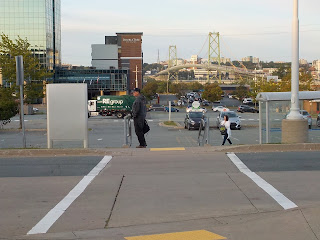The texts from the Roman Catholic Lectionary today challenge our application of mercy.
 |
| Worthy or needy |
The reading from the Book of Jonah describes how Jonah tries to run away from God.
It is followed by a Psalm of Thanksgiving.
* [2:3–10] These verses, which may have originally been an independent composition, are a typical example of a song of thanksgiving, a common psalm genre (e.g., Ps 116; Is 38:9–20). Such a song is relevant here, since Jonah has not drowned, and the imagery of vv. 4, 6 is appropriate.1
In the Gospel of Luke, Jesus cites the Greatest Commandment and gives the Parable of the Good Samaritan as the example of the mercy of God.
* [10:25–37] In response to a question from a Jewish legal expert about inheriting eternal life, Jesus illustrates the superiority of love over legalism through the story of the good Samaritan. The law of love proclaimed in the “Sermon on the Plain” (Lk 6:27–36) is exemplified by one whom the legal expert would have considered ritually impure (see Jn 4:9). Moreover, the identity of the “neighbor” requested by the legal expert (Lk 10:29) turns out to be a Samaritan, the enemy of the Jew (see note on Lk 9:52).2
When Carol Zuegner asks the question about whether “I love God and my neighbor in the way described in the gospel”.
The mercy of the Samaritan came with compassion and commitment. God will love me even when I fall short, but I can do more to be like the Samaritan with compassion and commitment. I can turn to God to help me do the harder thing, to go beyond the surface and show compassion to those around me. I can help a colleague who asks for assistance on a project even when I’d rather just go home. I know there are ways I can lighten the load of those around me, those in my neighborhood and my city who need my help not just once but with commitment.3
Don Schwager quotes “God desires to be our neighbor,” by Saint Augustine of Hippo, 354-430 A.D.
"God our Lord wished to be called our neighbor. The Lord Jesus Christ meant that he was the one who gave help to the man lying half-dead on the road, beaten and left by the robbers. The prophet said in prayer, 'As a neighbor and as one's own brother, so did I please' (Psalm 34:14 ). Since the divine nature is far superior and above our human nature, the command by which we are to love God is distinct from our love of our neighbor. He shows mercy to us because of his own goodness, while we show mercy to one another because of God's goodness. He has compassion on us so that we may enjoy him completely, while we have compassion on another that we may completely enjoy him. (excerpt from CHRISTIAN INSTRUCTION 33)4
The Word Among Us Meditation on Jonah 1:1–2:2, 11 notes that time after time, Jonah sets limits on God’s actions and the reach of his mercy, only to be shown how limitless it really is. Though it is included in the collection of the prophetic books, Jonah is, at its heart, a parable that corrects the widespread notion that God only cares about his chosen nation, Israel.
Jonah can show us the difference between our narrow viewpoint and God’s expansive vision. We can’t let our ideas of who is acceptable and who isn’t overshadow our grasp of God’s desire to restore every sinner. As often as we, like Jonah, try to limit God’s mercy, that’s how often he extends it—frequently to the very people we think don’t deserve it. That’s the point: we all need mercy, and God offers it especially to those most in need. May we all allow God to stretch our expectations and to expand our vision!5
Friar Jude Winkler explains the resistance of Jonah to preach to the Ninevites. The tension between universality and election in our religion is to be respected and used appropriately. Friar Jude reminds how Luke frequently uses a “zinger” that may frustrate and anger us.
Fr. Richard Rohr, OFM, quotes from Francis of Assisi, “The Testament,” lines 1-3. “And the Lord . . . led me among them and I showed mercy to them. And when I left them, what had seemed bitter to me was turned into sweetness of soul and body. And afterwards I delayed a little and then I left the world.” —Francis of Assisi [1].
When Francis said, he “left the world,” he was not talking about creation, which he loved. He was talking about the “rotten, decadent system” as Dorothy Day called it. [2] He was giving up on the usual payoffs, constraints, and rewards of business-as-usual and was choosing to live in the largest Kingdom of all. To pray and actually mean “Thy Kingdom come,” we must also be able to say “my kingdoms go.” Francis and Clare’s first citizenship was always, and in every case, elsewhere (Philippians 3:20), which ironically allowed them to live in this world with joy and freedom.6
The commitment of our talents, time, and treasure to be agents of mercy is to follow Jesus example and is a challenge to the cultural constraints of others needing to be worthy of our time and mercy.
References
No comments:
Post a Comment